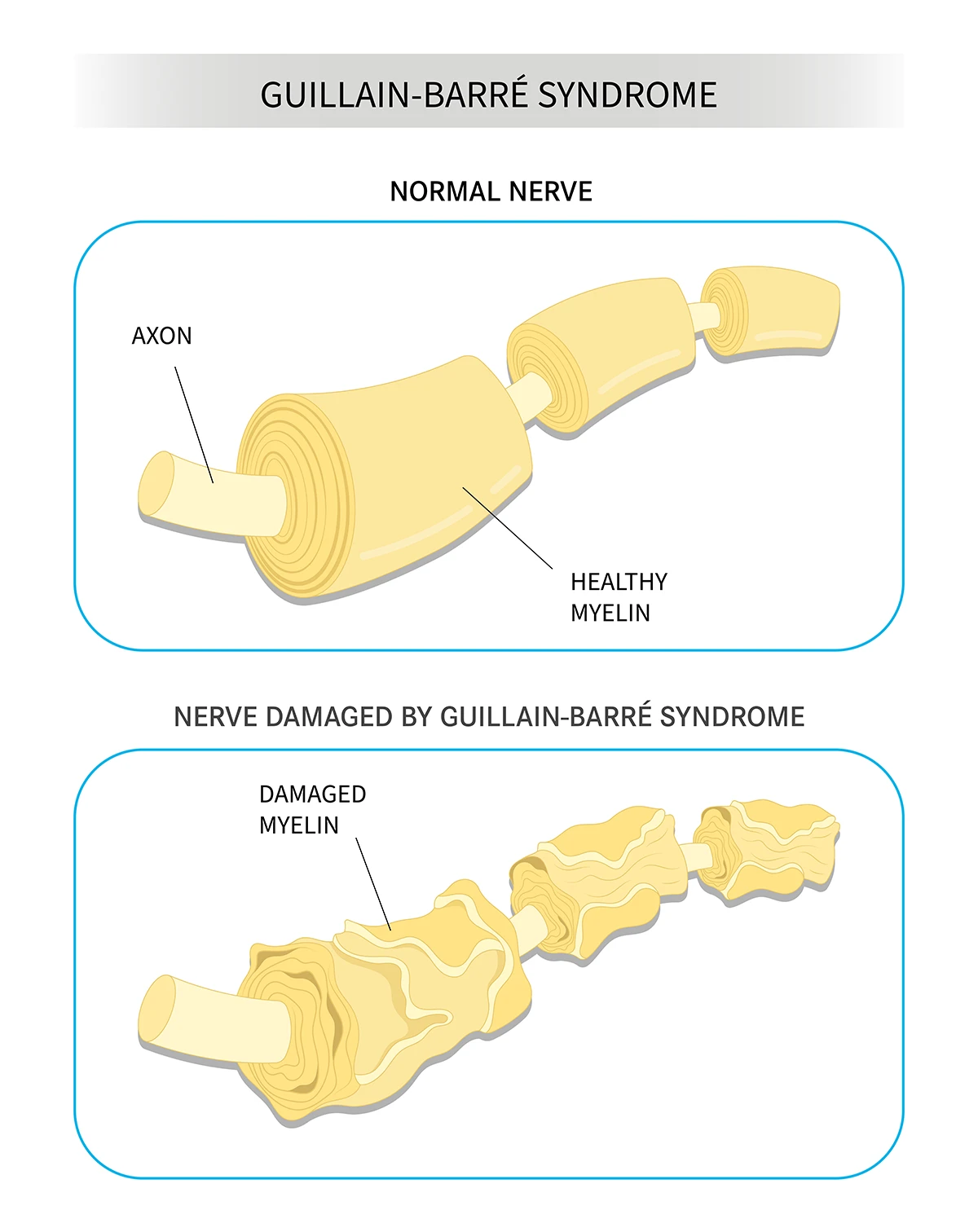Guillain-Barre syndrome
Find a neuro specialistGuillain-Barre syndrome is a rare autoimmune condition that causes muscle weakness. The effects start quickly and may get worse within a few hours. Many people recover completely from it, but some of the complications can be life-threatening.
What is Guillain-Barre syndrome (GBS)?


Image shows the difference between a healthy nerve and a nerve with its myelin sheath damaged by Guillain-Barre syndrome.
When you get Guillain-Barre syndrome, antibodies from your immune system attack the protective covering (myelin sheath) of your peripheral nerves by mistake. Peripheral nerves carry messages from the brain and spinal cord to the rest of your body. Antibodies may also cause damage to the axons, the parts of nerves that carry messages. When your nerves are damaged, their messages don’t reach your muscles completely, which causes weakness and other symptoms.
We don’t know what causes Guillain-Barre syndrome and there’s no known cure. It’s not inherited and it’s not contagious. We do know that it occurs more often among men and among people older than 50.
Another name for Guillain-Barre syndrome is acute inflammatory demyelinating polyradiculoneuropathy (AIDP).
Guillain-Barre syndrome triggers
GBS is triggered by other infections or events. Research shows that the following things may happen in the weeks before you get GBS:
- Diarrhea or a respiratory infection: About two thirds of people who have GBS have had diarrhea or a respiratory infection weeks before getting GBS. One of the most common causes of diarrhea that is linked to GBS is the bacteria Campylobacter jejuni.
- Viral infections: You may get GBS after you’ve had influenza (flu), cytomegalovirus, Epstein Barr virus, Zika virus or other viruses.
- Vaccinations: GBS may rarely happen after receiving some vaccines. However, the risks from not receiving those vaccines are much higher than the risks of getting GBS after getting a vaccine.
Guillain-Barre syndrome symptoms
Guillain-Barre syndrome symptoms occur and get worse quickly – within hours, days or weeks. In addition to muscle weakness, early symptoms may include tingling in both legs or in your arms and upper body. Other symptoms are:
- Difficulty with eye muscles and vision
- Difficulty swallowing, speaking or chewing
- “Pins and needles” feelings in the hands and feet
- Pain that can be severe, particularly at night
- Coordination problems and unsteadiness
- Abnormal pulse rate
- High or low blood pressure
- Problems with digestion and/or bladder control
Some people have paresthesia, which means they have odd sensations like the feeling of insects crawling under their skin. No two people experience the same type or intensity of symptoms. Whatever your symptoms are, when you have GBS, they affect both sides of your body equally.
Complications of Guillain-Barre syndrome
Severe cases of GBS are rare. Dangerous complications of Guillain-Barre syndrome include:
- Paralysis of the muscles that control breathing
- Blood infection
- Blood clots in the lungs
- Cardiac arrest
People who have Guillain-Barre syndrome are typically hospitalized so they can be monitored for such complications, which may happen suddenly.
Guillain-Barre syndrome diagnosis
Diagnosis of Guillain-Barre syndrome is based on your symptoms, their speed of onset and whether they’re affecting both sides of your body.
Your doctor will also perform a neurological exam to test your reflexes and pinpoint which parts of your body exhibit symptoms.
After beginning treatment, your doctor may order additional tests to help guide treatment or confirm the diagnosis such as:
- Lumbar puncture to gather cerebrospinal fluid (CSF) for evaluation
- Electromyography (EMG) to measure the health of muscles and nerves
- Blood tests to identify underlying viral or bacterial infections
- MRI of spinal cord or brain to rule out other potential causes of symptoms
Guillain-Barre syndrome treatment options
Treatment for Guillain-Barre syndrome focuses on relieving symptoms, shortening the length of the illness and monitoring for severe complications. You may receive medications for pain relief and to prevent blood clots.
Being in the hospital allows your health care team to use medical devices to continuously monitor functions like breathing, heart rate and blood pressure – and provide additional care quickly if needed. You may need to be treated with a ventilator to support breathing.
Guillain-Barre syndrome treatments with blood products
Since symptoms of Guillain-Barre syndrome are caused by the immune system, blood products are sometimes used to provide healthy antibodies. Two treatments that are often provided are:
- Blood plasma exchange: Involves using an apheresis machine to remove your plasma from your blood and replace it with donated plasma. This removes the antibodies that are attacking your nerves and replaces them with healthy antibodies.
- Intravenous immune globulin (IVIG) infusion: Immunoglobulins, which are antibodies, are separated from donated plasma collected from many individuals and then injected into your bloodstream. This procedure adds large numbers of healthy antibodies to your blood.
These GBS syndrome treatments typically take several hours to complete and are commonly administered on an outpatient basis.
Recovery period of GBS
Most people recover completely from Guillain-Barre syndrome. Recovery usually starts within about a month, but it can take several months to a few years to completely recover. During recovery, you may have lingering muscle weakness and fatigue.
Rehabilitation and physical therapy play an important part in recovery from GBS. Physical therapists will work with you to make sure you regain strength and range of motion.
It’s sobering to realize that some people have permanent nerve damage, weakness, numbness, pain or fatigue after having Guillain-Barre syndrome, although this is rare. These long-term symptoms may make walking and other activities difficult. Occupational therapy and vocational therapy can help you learn new ways to handle everyday activities.
Get care
We help you live well. And we’re here for you in person and online.